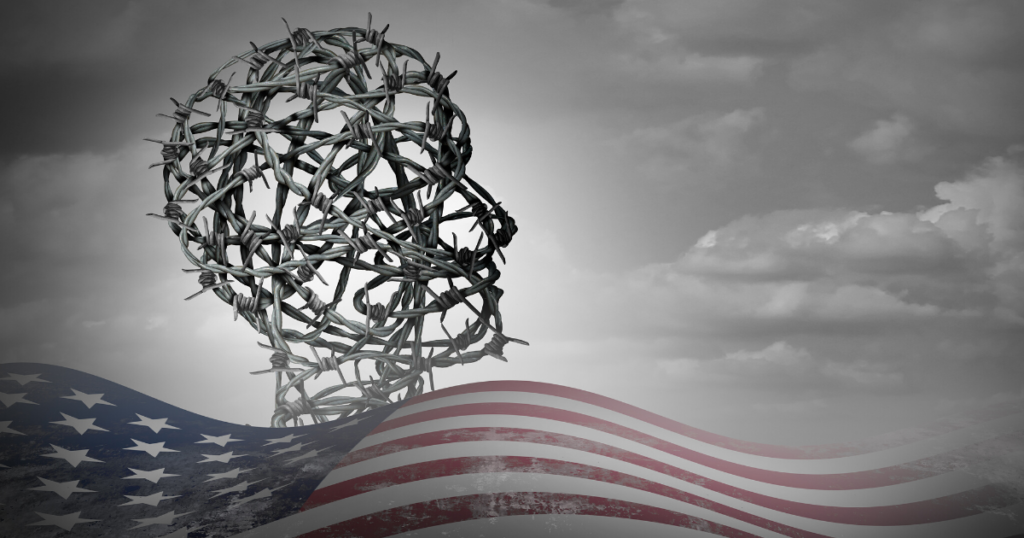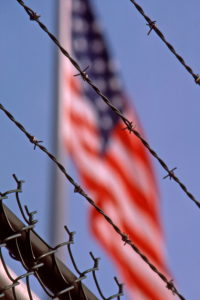
Where Due Process and Human Rights Cease to Exist
By Administrator
Operating in a court where due process rights don’t exist
Did you know that of the tens of thousands of asylum seekers arriving throughout 2019 and 2020, less than 2% were represented by an attorney in court?
While they waited for their court hearings, asylum seekers were forced to live in makeshift refugee camps in Mexico along the border where they suffered horrific violence including assault, kidnapping, and rape.
In 2019, the federal administration announced their Migrant Protection Protocol (MPP), a new policy aimed to reduce the amount of asylum seekers coming to the United States. The policy required Spanish speaking asylum seekers to remain in Mexico while their asylum court cases were processed in border towns across the United States. Having no infrastructure to process all of these cases along the border, the Department of Justice set up immigration courts inside temporary tents, creating tent courts where families’ fates were decided by judges who appear through a VTC (video conferencing).
In February 2020, BakerRipley was proud to send an attorney to Brownsville, Texas as part of a Houston delegation of attorneys.
Kate Chapman, BakerRipley Immigration Attorney, represented clients inside of a tent court during this trip, and shares her personal narrative below of what it was like to operate in a court where due process rights and human rights have now ceased to exist.
Human rights have now ceased to exist
 The address on the court notice is a border field at least a mile from the tent courts. There are no signs. You think, I’m not going to have a problem finding a government compound of white tents, but you will not see them. There is a checkpoint office on the same block. When I asked where the MPP courts were, they did not know. The entry was ten yards away.
The address on the court notice is a border field at least a mile from the tent courts. There are no signs. You think, I’m not going to have a problem finding a government compound of white tents, but you will not see them. There is a checkpoint office on the same block. When I asked where the MPP courts were, they did not know. The entry was ten yards away.
A scrum of subcontracted private security guards keep out the public. My suit is winter thick but the trailer is cold. They keep it that way, like the hieleras (ice chests). There is no reason for it. We are just uncomfortable enough to censor ourselves in hopes of getting out a minute or two sooner.
The guards are half adults, fresh-faced, strutting. Their black hats say SECURITY.
No one goes anywhere unescorted. The guards do not see the migrants cross the bridge to the cartels, shoelace-less and famished. Border Patrol does that. These guards stay inside the tents.
I want to be human with maybe one of them. But they have been given a dusting of power.
We are not safe
I tell my client that I will try to get what she wants from the judge, which is almost nothing at all. She cannot see well, and she has a heart condition. Children turn back at random moments through the morning. They smile at me.
Another man insists he speaks no Spanish. He beseeches the judge in the screen as his child fidgets beside him. When the Mexicans hear him praying aloud at night to keep himself calm, they taunt him and call him a demon, an idiot.
He presses for an interpreter, a vestige of fairness that frays, tattered, exposing skin.
The judge has rehearsed his new procedures.
He tells the migrants what the law requires: (it does not). He wishes the January-born happy birthday.
They “will receive the opportunity to request protection from the country” they fear.
Then he returns them there.
The man tells the judge again. We are not safe. The judge: “There will be time for a full airing of your fear at a future time.”
Another father tries to get my attention. He motions for my card. I gesture that I have none.
The video records everything. I do not know if I am allowed to speak to him. He tries again after I go before the judge. I tell the guard to help him. I avoid his eyes.
Three days later, I am safe at home with walls and doors. I could not have protected you, or your son.
At the next hearing, I pretend that the guards are my avuncular uncles and I am one of the boys. The judge has no record of my request to keep my clients from being forced back to Mexico, but she offers me one. We humbly accept whatever passes for due process—with no time to prepare.
Two weeks later, the border is closed. Border Patrol is given new rights to quickly expel migrants. They can disregard fear of persecution. If it did not matter before, it does not matter now.
About BakerRipley
 Established in 1907 in Houston’s Second Ward (East End), BakerRipley has a 113-year track record of responding to growth and change in the Houston region. Founded on the structure of our six neighborhood community centers in vulnerable neighborhoods, and a vision to crush inequities by maximizing the assets of those communities, we deliver holistic services in the areas of immigration, workforce and career development, education, senior care, wellness and community engagement. The BakerRipley immigration program helps immigrants navigate complex legal and social systems, opening pathways to citizenship and encouraging full participation in their community. In recent years, the program has focused on representing vulnerable asylum seekers who are facing deportation in the Immigration Courts.
Established in 1907 in Houston’s Second Ward (East End), BakerRipley has a 113-year track record of responding to growth and change in the Houston region. Founded on the structure of our six neighborhood community centers in vulnerable neighborhoods, and a vision to crush inequities by maximizing the assets of those communities, we deliver holistic services in the areas of immigration, workforce and career development, education, senior care, wellness and community engagement. The BakerRipley immigration program helps immigrants navigate complex legal and social systems, opening pathways to citizenship and encouraging full participation in their community. In recent years, the program has focused on representing vulnerable asylum seekers who are facing deportation in the Immigration Courts.
The COVID-19 crisis presents a unique set of circumstances and challenges for Humanist Grant beneficiary organizations. Help us continue adapting the Humanist Grants program to the current environment by making a contribution today.
